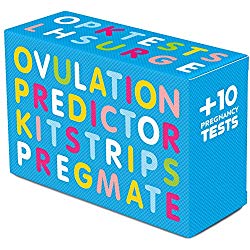$12.95
$12.95
(SAVE Now!)
as of 12/22/2024 (Details)
HOW DOES IT WORK?LH (Luteinizing Hormone) is one of the hormones produced by the pituitary gland. It is secreted at very low levels throughout your menstrual cycle. Once a developing egg follicle reaches a certain size, LH secretion surges to high levels. This hormone surge is what triggers ovulation about 24 to 48 hours later. Your LH surge is important because it initiates the beginning of ovulation.Ovulation is the release of a mature egg from the ovary. It signals the beginning of your fertile period. A positive result indicates the presence of a high amount of LH or LH surge. The amount of LH in your body will begin to decrease after ovulation, so you'll only get a positive result during that crucial fertile period. Once the egg is released, it is only viable for about 24 hours. After that, your fertile window is over. This makes it very important to be able to identify this best time to conceive.Ovulation may be irregular because of conditions, emotions and other factors in your life. You can't presume that ovulation always occurs at the same time after menstruation. Therefore, you should test again in each menstrual cycle.HOW TO DO THE TEST?Immerse the strip into the urine.Take the strip out after 3 seconds.Lay the strip flat.Read results in 5 minutes.HOW TO READ THE RESULTS?LH Surge: If two color bands are visible, and the test band is equal to or darker than the control band, one will probably ovulate in the next 24-48 hours.If trying to get pregnant, the best time to have intercourse is after 24 but before 48 hours.No LH Surge: Only one color band appears on the control region, or the test band appears but is lighter than the control band. This means there is no LH surge. Invalid: No visible band at all or there is a visible band only in the test region and not in the control zone.
Technical Details
- HOW DOES IT WORK? Ovulation is the release of a mature egg from the ovary. It signals the beginning of your fertile period. A positive result indicates the presence of a high amount of LH or LH surge. The amount of LH in your body will begin to decrease after ovulation, so you'll only get a positive result during that crucial fertile period. Once the egg is released, it is only viable for about 24 hours. After that, your fertile window is over.
- WHEN TO BEGIN TESTING? The length of the menstrual cycle is the duration from your first menstrual bleeding day to the day before the next bleeding begins. Determine the length of menstrual cycle before test. Please refer to the cycle chart to determine when you should start testing. If you do not know your cycle length, you may begin the test 11 days after your first period since the average cycle length is 28 days.
- HOW TO READ THE RESULTS? LH Surge: If two color bands are visible, and the test band is equal to or darker than the control band, one will probably ovulate in the next 24-48 hours. If trying to get pregnant, the best time to have intercourse is after 24 but before 48 hours. No LH Surge: Only one color band appears on the control region, or the test band appears but is lighter than the control band. This means there is no LH surge.
- PREGMATE HCG PREGNANCY TESTS measure the levels of the pregnancy hormone Human Chorionic Gonadotropin (HCG) in your urine. This hormone is produced by the cells of the embryo that will later form the placenta. The level of HCG starts to increase from its basal level of less than 5 mIU/mL directly after implantation, and doubles about each 48 hours during the first weeks of pregnancy.
